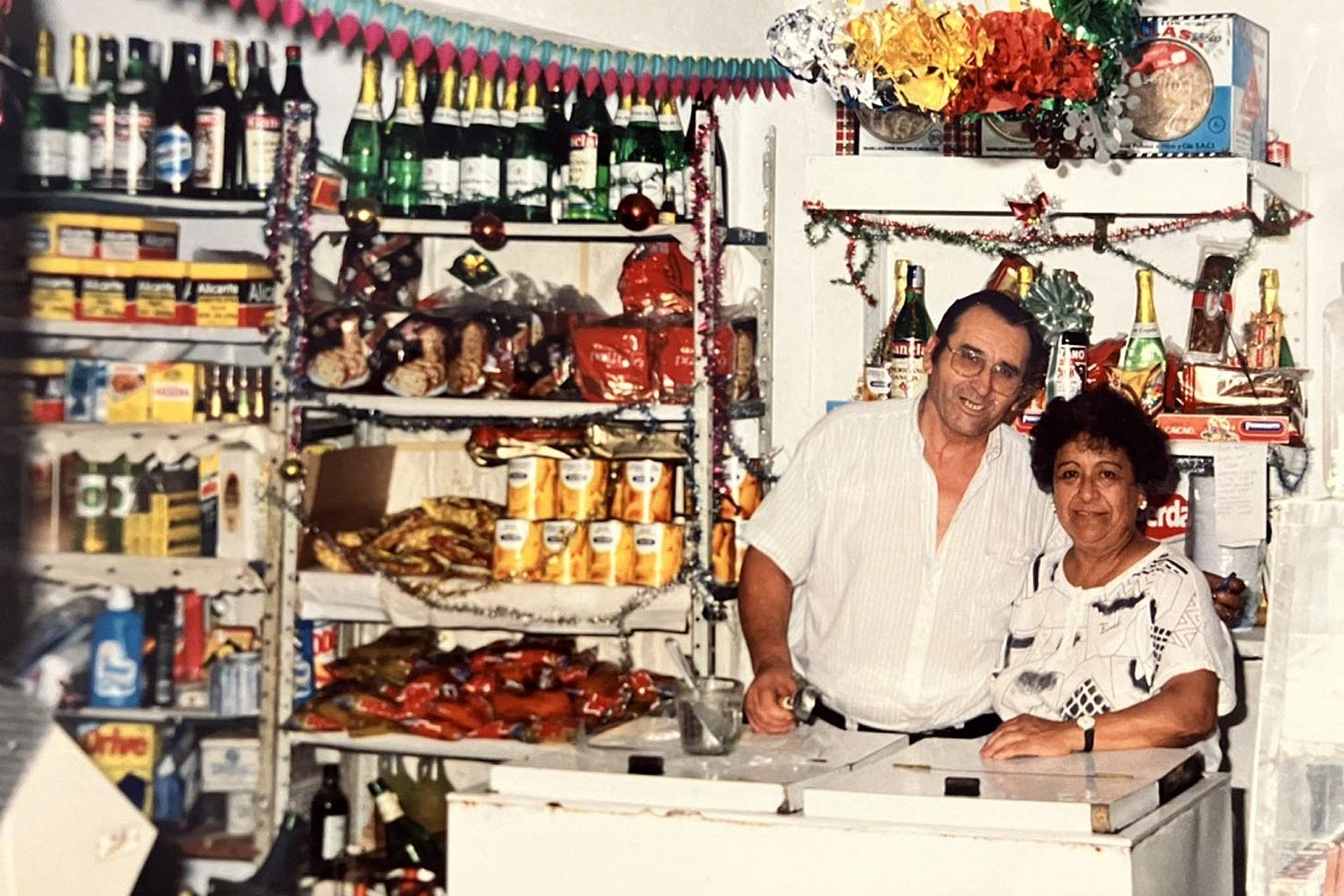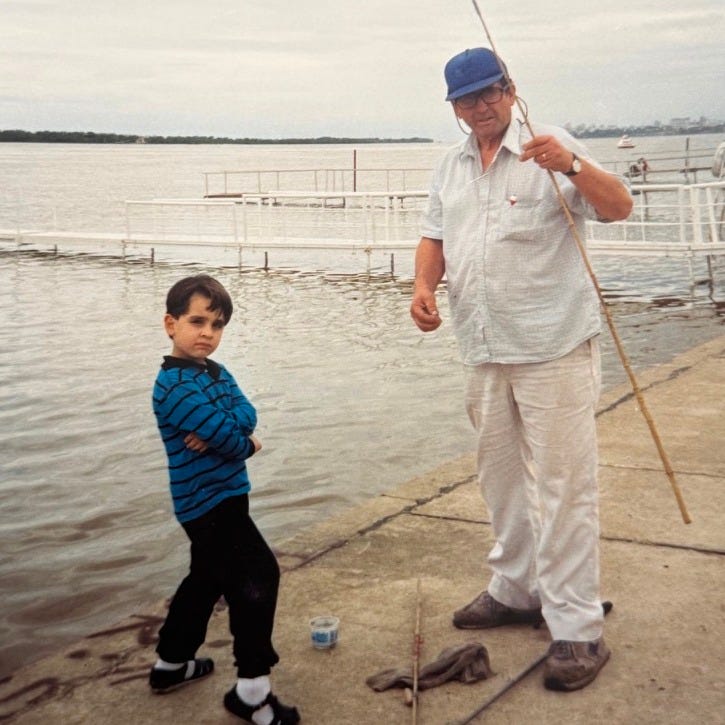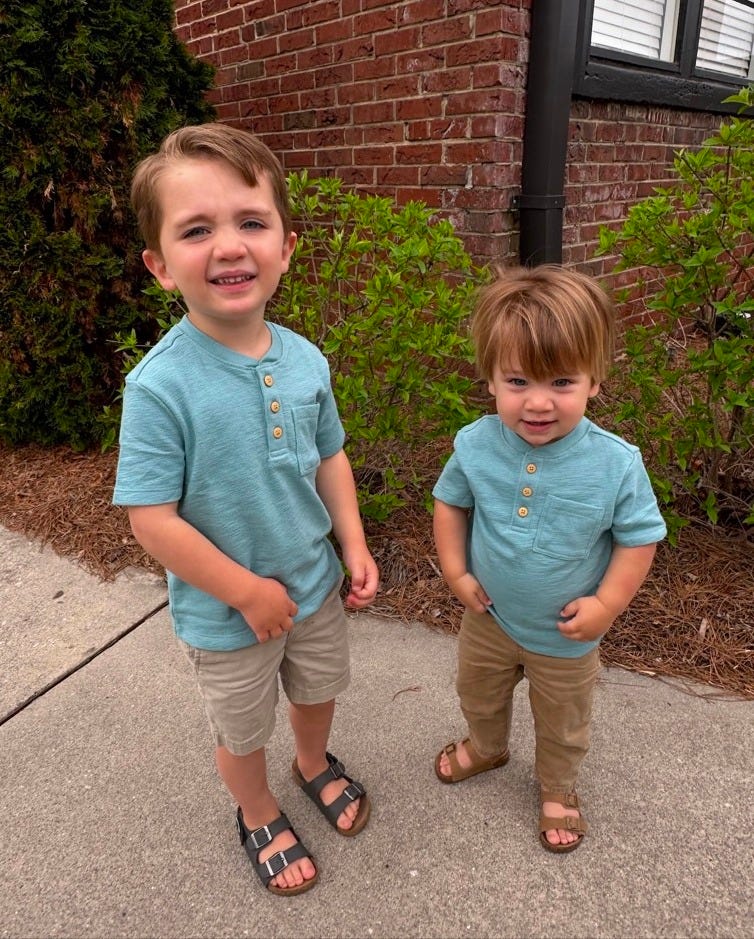Finding my Family
The Canevers of the World Wide Web and how I discovered where I come from.

I’d always known my surname was uncommon because, even though the origins seem Italian, I am missing a critical vowel. I am not Cannavaro, like the famous Napolitano, Fabio, who captained his nation to World Cup glory in 2006. Nor am I Canevari, like Carlo, the lesser-known Italian artist from Milan who died when I was 7.1
The keeper of my surname—my grandfather, Mario—was an orphan raised on a farm in Córdoba, Argentina, by strangers who promised a mattress and hot meals in exchange for his labor. He and his brother, Luis, were abandoned there by their widowed mother after she met an older man who didn’t want to raise another man’s children. As such, he had histories that were more speculation than scientific theory. Growing up in an immigrant town like Bayonne, not 6 miles from Ellis Island—the touch-down point for so many millions of new Americans—everyone seemed to have a twisted family tree to speak of. Many, like my grandfather’s, were cut at the head by war, poverty, and abandonment. So, instead of the surety provided by documentation or, much later, Ancestry.com, we imagined who and what made us.
My father told me we were Dutch. Or was it German? Or French! “But from the part of France that butts up against Germany and goes back and forth in wartime,” I told my middle school friends: unbelievers who informed me that my skin tone did not match either origin story. Though before even taking into account the other lineages that make me me—the mixed native and Spanish blood on my paternal grandmother and maternal grandfather’s sides, the Calabrian in my maternal grandmother’s line2—I knew by the contours of my face that the furthest north my people could’ve come from was Bilbao.3
And I could’ve settled on being Spanish or Italian, like the majority of Argentinians, if my parents had named me properly. But instead of Diego or Martín4, Fabrizio or Luciano, they chose Brian, as so many who left the Latin half of our continent for the Anglo one did, because “it sounded American.” The detachment of my first name, I think, made me more eager to figure out the origins of my last one.
By the grace of God, Facebook arrived in the mid-2000s. And before it became rotted to the core—when it was still a garden in Eden, connecting long-lost relatives, not selling ads for male enhancement pills—it brought me invitations to join groups made up of other Canevers.
There was Marcos Canever Fraga, a lawyer in Porto Alegre, who is married and reshares memes on Facebook and has also been to Machu Picchu. He runs the “Os Canever” group, which contains other Brazilians like Neusa Canever, who lives in Orleans and posts religious content every morning, and Valdemar from Cascavel, Parana, who is a sponsored mountain bike rider, and Gilmar, who is a sergeant in the military fire squad of Santa Catarina.5
In Brazil, there is also Mario Canever, a man who shares the name of my paternal grandfather but is a professor of agricultural science at the Universidad de Pelotas (literally, the University of Balls) and, in 2007, authored a paper on supply chain strategy for a prominent scholarly journal.6
Oh and how could I forget Guilherme, the world-traveler, who writes Kindle books on countries that do not exist and is, perhaps, the Canever I might’ve been if I had been born brave, instead of someone one who watches The Secret Life of Walter Mitty or Big Fish or The Motorcycle Diaries every year on his birthday and cries alone on the living room sofa.
There are my cousins who live in Rosario and Capitán Bermudez—those I know well, though we rarely exchange messages on WhatsApp, our trajectories in life being so divergent (although one is a communist who runs a bookstore for the proletariat and is a fan of the same football club). His father, my uncle Fito, starts a new Facebook account every time he’s locked out of his old one. He’s up to 7.
There is Franco, a professional soccer player—the most famous of the Canevers—and his little sister, Luisiana, with whom I exchanged Facebook messages in 2009. She is the granddaughter of my great-uncle Luis and thought we might be the ones to bring our grandfathers back together after decades of estrangement. See, Luis had stayed in Córdoba, while Mario had fled at the first opportunity to start a new life of labor in the province of Santa Fe, where he met my Abuela Tota and had my dad. Luisiana—who is now married and has a daughter who likes to roller skate—was naive, like me, thinking that borders could be crossed without the power of God. But something must’ve happened growing up on that strange farm, as boys bearing the trauma of being discarded by their mother and forced to make do in a foreign place, and it ripped them apart. Mario and Luis died without knowing each other again.
On a lighter note, some Canevers made it to Australia. There is the man-bun-wearing Nicolo, an Italian chemist who earned his PhD in 2022 from the University of Newcastle, and Loretta, a former teacher and member of the Construction, Forestry, and Maritime Employees Union in Melbourne who spends her retirement attending plays at the local theatre. (My mother, of the Diaz line, lived in Melbourne in the 1970s with Nona and Nona as part of a government program that brought Argentinian workers to the Land of Oz.)
Of course, a few Canevers, besides my own, made it to North America, too. Laura is a veterinary oral surgeon in Fenton, Michigan. I assumed it is her father who has my brother’s first name and runs a Chevy dealership, the most prominent Canever on the internet. Maybe it’s her sister, Elizabeth, who owns a franchise of Painting with a Twist in the same city?
There’s a second Laura Canever who works in PR in Verona, and Florent Canever, a transportation and logistics manager in France, who participates in medieval festivals and does cosplay. Another Frenchie, Helena Canever, relocated to Austin, Texas, in 2023, and works in AI prompt engineering, because there’s more money to be made in inciting a robot uprising than in being a PhD physiologist, as she became in 2021. Yannick, possibly a cousin or her brother, makes video games in Bordeaux, a city Haley and I planned to travel to in 2019 if she hadn’t gotten pregnant with Alba, our eldest daughter, that spring. Of course, she did, within a month of trying, and it is now unlikely that we will see Europe before retirement, the cost of traveling as a family of six being equal to a half-year’s worth of mortgage payments.
In those early years on Facebook, I searched over the river and through the woods to uncover my origins, but turned up little more than myth.
“We have to be Italian,” some of the other Canevers online said.
“Who cares?” others wrote back. “As long as we have each other, we know we’re not alone. We don’t need vowels to tell us who we are or where we’re from!”
But I simply had to know.
And then a man so indistinct that I’ve forgotten his first name—perhaps it was Roberto, the project engineer in Verona—who said, yes, cousin, you are one of us. A son of Italy!
“But what of the o’s and the i’s, Roberto,” I typed. “Should we not be Canevaris or Canavarros like the rest?”
“No, no, cugino,” he responded. “Our people are from Venice. There is no vowel. It is an old Venetian word, like your Millers and Masons and Carpenters, for the labor we once did.”
But because our exchange took place before Google Translate and ChatGPT, what he said next was lost to me. Something about vineyards or wine. Were we people of the vine? I thought to myself. Judging by father’s habits of consumption alone, it made sense that our history might tie us to the grape elixir. I took to the internet to confirm what Roberto spoke of and found nothing.
Then, out of nowhere, around the year 2021, after adding quotation marks to my Google search—an old trick to isolate results—about a dozen pages in, a link to an Italian textbook appeared. It was published in 2007 by Filippo de Vivo, Information and Communication in Venice: Rethinking Early Modern Politics. Google Books provided a screenshot of where the solitary reference appeared.
On page 96 was the following paragraph:
Less affluent establishments [in Venice] were specifically devoted to the entertainment of a large range of people. Accommodation and nourishment of locals and visitors was an important aspect of the urban economy, which in 1624 was said to employ a quarter of household heads in widely different activities, from tavern-keeper to cook, cellar-keeper and handiman (canever and sfadigante).
Based on the order, I could assume we were…cellar-keepers?
The cellar is always where the best wine is kept. So, perhaps Roberto was right. But a detective is never satisfied with a single clue. I followed the trail, which led to an article by another Italian, Michela dal Borgo, “At the Origin of Hospitality: Venetian Hostelry, Tavern and Lodging between the Fourteenth and Eighteenth Centuries.”
This has to be connected, I thought. So I clicked, hit Ctrl + F, and typed in Canever.
Two references appeared.
The first was to the State Innkeepers, who, until the late 1700s, had exclusive licenses to cook and sell meals and drinks to visitors. “However, they and their family had to live within the tavern with the servants, usually a canever (a person in charge of the cellar), a piccolo di caneva (a young boy in charge of the cellar), a cook, a waiter, and a scullion.”
The second reference was of a specific incident, in 1575, during which a famous establishment, once belonging to the Knights Templar, and then taken over by Pope Clemente V and sold to the city’s procurators, was ordered closed “due to the plague and after the death of the canever and some servants.” The tavern subsequently burnt to the ground.
I’ve written before about how my life’s great ambition is to appear on the Notable People section of Bayonne’s Wikipedia page. I won’t lie: on occasion, I search for myself there, wondering if the criteria have been relaxed enough to include a mediocre writer who left at 22. But until recently, the only Canever on the Wiki pages was my cousin Franco, the footballer.
Just last week, I returned to look again and found our name appeared a second time, under the entry for Governatore dei condannati, which was the title for the senior commander of the navy of the Republic of Venice in the 16th century. “The post initially headed the galley squadron manned by convicts and captives rather than free crewmen,” it reads. The governor’s personal staff included “a head of household (maestro di casa), a steward (scalco), a cook (cuoco), a wine steward (canever), and two orderlies (fanti di pizzuol).”
So there it is.
The internet, despite my distrust, did for me what my father and my Abuelo Mario could not. It connected me to the past. It brought me to my family.
From time to time, I question whether I should reach out and tell the others. Whether I should find Roberto again and inform him that, yes, we once were cellar-keepers and wine stewards, living in the shadows, belowground, until plagues came and killed us. That some of us made it out, as far as America, and are now plumbers and artists and veterinarians.
Would they care as much as I have? I’m not sure. All I know is, living in a place like Tennessee, where most people trace their roots back 200 years at least, it’s mattered to me to uncover that my own go back as far as 1500. I may never know who was the first to leave and make their way by boat to Argentina. But I know, just as my father broke ground for our people in North America, that I am called to do something more for the Canever name than look backwards.
I have two boys. I have a family history that I am trying to rewrite before the new heaven and earth arrive.
Raise a glass—of malbec or some other red—and wish me luck.
Before you leave, support my work by upgrading to a paid subscription for as little as $4.17/month ($50/year). You can also buy me a coffee, order a copy of either my first story collection or my epic Ping-Pong novella, or listen to my stories on YouTube and Spotify.
Or, as I learned this spring, as my business unit at the university explored a potential partnership at work with Estée Lauder, the company’s current EVP of supply chain, Roberto, also an Italian.
I could write too much about my family and their origin stories. The grandfather I grew up with in New Jersey, Nono, is the subject of “Not So Different After All” and “No Soy de Aquí, Ni de Allá.” And he insisted his father, a butcher who abandoned the family for the bottle when my grandfather was 12, was of pure Spanish blood. My Nona, who is small and blonde, is the product of an Italian immigrant who left his homeland after the First World War and a mother who, like my Abuelo Mario, was an orphan. In college, I learned that my long-time barber, Tony, a typical Italian immigrant to Bayonne, was a distant relative of my grandmother’s, which explained why he was always present at the wakes of old people we knew who died. They each trace their roots to the same small town of San Vito sullo Ionio in the province of Catanzaro.
Judging by my shnoz alone, I would not have been surprised to learn that I was a Moor, or the great-great-great-great-grandson of some Turk who made it to Spain on horseback.
Two of the great emblems of Argentina: Diego Maradona, who won the nation its second World Cup three years before I was born, and Martín Fierro, the folk hero who is as pervasive a literary figure there as Huck Finn, though with more of an Outlaw Johnny Cash/Cowboy Clint Eastwood flair.
My father told stories, when I was a boy, of having relatives in Santa Catarina. Of exchanging correspondence, though of never having gone to visit. And what seems to be true is that whenever the ship containing the Canevers of Europe arrived in the New World, some got off in Brazil, while others ventured on to Argentina.
I mention this only because I now work with supply chain scholars in what is one of the world’s top programs. We also have a Brazilian, though not a Canever. Last summer, we played in a South American classic rock cover band together, as chronicled in “La Vida Rockera.”




